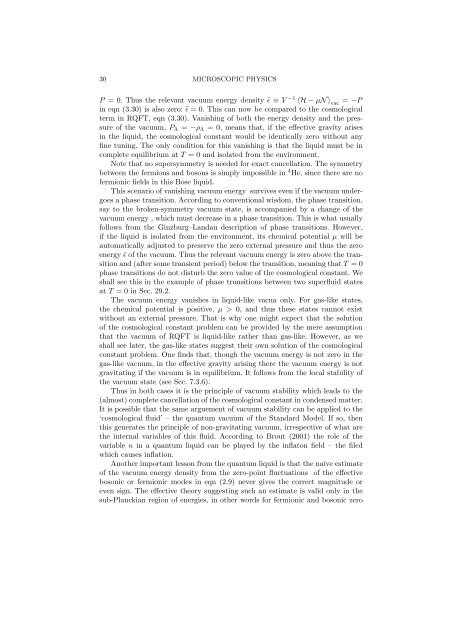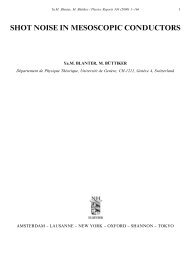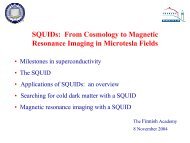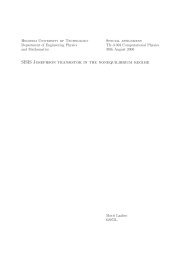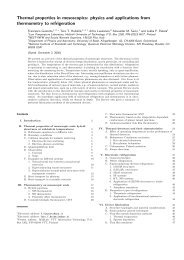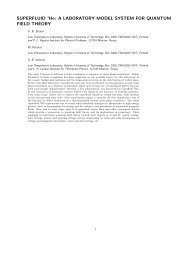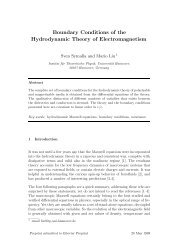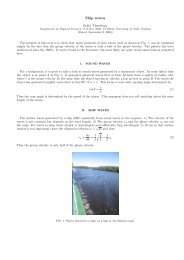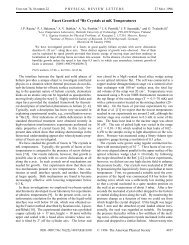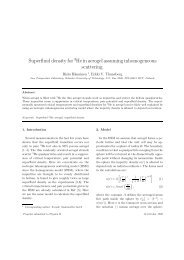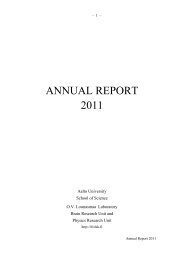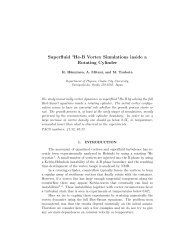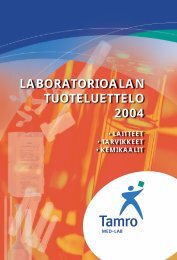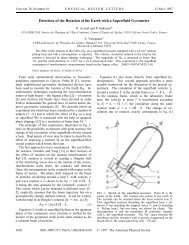- Page 1 and 2: THE INTERNATIONAL SERIES OF MONOGRA
- Page 3 and 4: The Universe in a Helium Droplet GR
- Page 5 and 6: FOREWORD It is often said that the
- Page 7 and 8: CONTENTS 1 Introduction: GUT and an
- Page 9 and 10: 7.3 Vacuum energy of weakly interac
- Page 11 and 12: 10.5.6 Origin of precision of symme
- Page 13 and 14: 15.2.5 Nielsen-Olesen string vs Abr
- Page 15 and 16: 21.1 Spin and statistics of skyrmio
- Page 17 and 18: xvii 26.3.1 Landau criterion for vo
- Page 19 and 20: 31.2.5 Vortex as gravimagnetic flux
- Page 21 and 22: 2 INTRODUCTION: GUT AND ANTI-GUT Bi
- Page 23 and 24: 4 INTRODUCTION: GUT AND ANTI-GUT in
- Page 25 and 26: 6 INTRODUCTION: GUT AND ANTI-GUT Th
- Page 27 and 28: 8 with Fermi points. Using these mo
- Page 30 and 31: 2 GRAVITY Since we are interested i
- Page 32 and 33: VACUUM ENERGY AND COSMOLOGICAL TERM
- Page 34 and 35: VACUUM ENERGY AND COSMOLOGICAL TERM
- Page 36 and 37: 3 MICROSCOPIC PHYSICS OF QUANTUM LI
- Page 38 and 39: THEORY OF EVERYTHING IN QUANTUM LIQ
- Page 40 and 41: WEAKLY INTERACTING BOSE GAS 21 3.2
- Page 42 and 43: WEAKLY INTERACTING BOSE GAS 23 3.2.
- Page 44 and 45: WEAKLY INTERACTING BOSE GAS 25 In t
- Page 46 and 47: FROM BOSE GAS TO BOSE LIQUID 27 The
- Page 50 and 51: FROM BOSE GAS TO BOSE LIQUID 31 mod
- Page 52 and 53: SUPERFLUID VACUUM AND QUASIPARTICLE
- Page 54 and 55: SUPERFLUID VACUUM AND QUASIPARTICLE
- Page 56 and 57: NORMAL COMPONENT - ‘MATTER’ 37
- Page 58 and 59: NORMAL COMPONENT - ‘MATTER’ 39
- Page 60 and 61: NORMAL COMPONENT - ‘MATTER’ 41
- Page 62 and 63: ENERGY-MOMENTUM TENSOR FOR ‘MATTE
- Page 64 and 65: LOCAL THERMAL EQUILIBRIUM 45 motion
- Page 66 and 67: LOCAL THERMAL EQUILIBRIUM 47 As bef
- Page 68 and 69: GLOBAL THERMODYNAMIC EQUILIBRIUM 49
- Page 70 and 71: 6 ADVANTAGES AND DRAWBACKS OF EFFEC
- Page 72 and 73: NON-LOCALITY IN EFFECTIVE THEORY 53
- Page 74 and 75: NON-LOCALITY IN EFFECTIVE THEORY 55
- Page 76 and 77: EFFECTIVE VS MICROSCOPIC THEORY 57
- Page 78 and 79: SUPERFLUIDITY AND UNIVERSALITY 59 i
- Page 80 and 81: SUPERFLUIDITY AND UNIVERSALITY 61 d
- Page 82: Part II Quantum fermionic liquids
- Page 85 and 86: 66 MICROSCOPIC PHYSICS Pressure (ba
- Page 87 and 88: 68 MICROSCOPIC PHYSICS Such a struc
- Page 89 and 90: 70 MICROSCOPIC PHYSICS the vector p
- Page 91 and 92: 72 MICROSCOPIC PHYSICS ˆm 2 = ˆn
- Page 93 and 94: 74 MICROSCOPIC PHYSICS term. The cu
- Page 95 and 96: 76 MICROSCOPIC PHYSICS for weakly i
- Page 97 and 98: 78 MICROSCOPIC PHYSICS to pF . (Not
- Page 99 and 100:
80 MICROSCOPIC PHYSICS mc 2 ≫|µ|
- Page 101 and 102:
82 MICROSCOPIC PHYSICS axis ˆzi (o
- Page 103 and 104:
84 MICROSCOPIC PHYSICS symmetry of
- Page 105 and 106:
8 UNIVERSALITY CLASSES OF FERMIONIC
- Page 107 and 108:
88 UNIVERSALITY CLASSES OF FERMIONI
- Page 109 and 110:
90 UNIVERSALITY CLASSES OF FERMIONI
- Page 111 and 112:
92 UNIVERSALITY CLASSES OF FERMIONI
- Page 113 and 114:
94 UNIVERSALITY CLASSES OF FERMIONI
- Page 115 and 116:
96 UNIVERSALITY CLASSES OF FERMIONI
- Page 117 and 118:
98 UNIVERSALITY CLASSES OF FERMIONI
- Page 119 and 120:
100 UNIVERSALITY CLASSES OF FERMION
- Page 121 and 122:
102 UNIVERSALITY CLASSES OF FERMION
- Page 123 and 124:
104 UNIVERSALITY CLASSES OF FERMION
- Page 125 and 126:
106 EFFECTIVE QUANTUM ELECTRODYNAMI
- Page 127 and 128:
108 EFFECTIVE QUANTUM ELECTRODYNAMI
- Page 129 and 130:
110 EFFECTIVE QUANTUM ELECTRODYNAMI
- Page 131 and 132:
112 EFFECTIVE QUANTUM ELECTRODYNAMI
- Page 133 and 134:
114 EFFECTIVE QUANTUM ELECTRODYNAMI
- Page 135 and 136:
116 EFFECTIVE QUANTUM ELECTRODYNAMI
- Page 137 and 138:
10 THREE LEVELS OF PHENOMENOLOGY OF
- Page 139 and 140:
120 THREE LEVELS OF PHENOMENOLOGY 1
- Page 141 and 142:
122 THREE LEVELS OF PHENOMENOLOGY t
- Page 143 and 144:
124 THREE LEVELS OF PHENOMENOLOGY L
- Page 145 and 146:
126 THREE LEVELS OF PHENOMENOLOGY F
- Page 147 and 148:
128 THREE LEVELS OF PHENOMENOLOGY s
- Page 149 and 150:
130 THREE LEVELS OF PHENOMENOLOGY m
- Page 151 and 152:
132 THREE LEVELS OF PHENOMENOLOGY 1
- Page 153 and 154:
134 THREE LEVELS OF PHENOMENOLOGY W
- Page 155 and 156:
136 MOMENTUM SPACE TOPOLOGY OF 2+1
- Page 157 and 158:
138 MOMENTUM SPACE TOPOLOGY OF 2+1
- Page 159 and 160:
140 MOMENTUM SPACE TOPOLOGY OF 2+1
- Page 161 and 162:
142 MOMENTUM SPACE TOPOLOGY OF 2+1
- Page 163 and 164:
144 MOMENTUM SPACE TOPOLOGY PROTECT
- Page 165 and 166:
146 MOMENTUM SPACE TOPOLOGY PROTECT
- Page 167 and 168:
148 MOMENTUM SPACE TOPOLOGY PROTECT
- Page 169 and 170:
150 MOMENTUM SPACE TOPOLOGY PROTECT
- Page 171 and 172:
152 MOMENTUM SPACE TOPOLOGY PROTECT
- Page 173 and 174:
154 MOMENTUM SPACE TOPOLOGY PROTECT
- Page 175 and 176:
156 violated at very low energy. Pr
- Page 178 and 179:
13 TOPOLOGICAL CLASSIFICATION OF DE
- Page 180 and 181:
DEFECTS AND HOMOTOPY GROUPS 161 (3.
- Page 182 and 183:
ANALOGOUS ‘SUPERFLUID’ PHASES I
- Page 184 and 185:
14 VORTICES IN 3 He-B 14.1 Topology
- Page 186 and 187:
TOPOLOGY OF DEFECTS IN B-PHASE 167
- Page 188 and 189:
ξ D soft core of soliton TOPOLOGY
- Page 190 and 191:
SYMMETRY OF DEFECTS 171 cluster, wh
- Page 192 and 193:
SYMMETRY OF DEFECTS 173 of rotation
- Page 194 and 195:
Δ ⊥ = Δ II B-phase SYMMETRY OF
- Page 196 and 197:
SYMMETRY OF DEFECTS 177 One finds t
- Page 198 and 199:
BROKEN SYMMETRY IN B-PHASE VORTEX C
- Page 200 and 201:
BROKEN SYMMETRY IN B-PHASE VORTEX C
- Page 202 and 203:
A-PHASE AND ANALOGOUS PHASES IN HIG
- Page 204 and 205:
SINGULAR DEFECTS IN A-PHASE 185 cor
- Page 206 and 207:
SINGULAR DEFECTS IN A-PHASE 187 Ano
- Page 208 and 209:
FRACTIONAL VORTICITY AND FRACTIONAL
- Page 210 and 211:
FRACTIONAL VORTICITY AND FRACTIONAL
- Page 212 and 213:
FRACTIONAL VORTICITY AND FRACTIONAL
- Page 214 and 215:
16 CONTINUOUS STRUCTURES 16.1 Hiera
- Page 216 and 217:
HIERARCHY OF ENERGY SCALES AND RELA
- Page 218 and 219:
CONTINUOUS VORTICES, SKYRMIONS AND
- Page 220 and 221:
CONTINUOUS VORTICES, SKYRMIONS AND
- Page 222 and 223:
CONTINUOUS VORTICES, SKYRMIONS AND
- Page 224 and 225:
CONTINUOUS VORTICES, SKYRMIONS AND
- Page 226 and 227:
soliton d ≈ constant VORTEX SHEET
- Page 228 and 229:
VORTEX SHEET 209 velocity v n = Ω
- Page 230 and 231:
VORTEX SHEET 211 building blocks fo
- Page 232 and 233:
2-nd bound state in vortex core sat
- Page 234 and 235:
`t Hooft-Polyakov magnetic monopole
- Page 236 and 237:
MONOPOLES TERMINATING STRINGS 217 c
- Page 238 and 239:
DEFECTS AT SURFACES 219 Bulk R=G/H
- Page 240 and 241:
DEFECTS ON INTERFACE BETWEEN DIFFER
- Page 242 and 243:
DEFECTS ON INTERFACE BETWEEN DIFFER
- Page 244 and 245:
DEFECTS ON INTERFACE BETWEEN DIFFER
- Page 246 and 247:
DEFECTS ON INTERFACE BETWEEN DIFFER
- Page 248 and 249:
DEFECTS ON INTERFACE BETWEEN DIFFER
- Page 250 and 251:
231 E(x 0) = n ¯h2 (∇Φ) 8m 2 +
- Page 252:
Part IV Anomalies of chiral vacuum
- Page 255 and 256:
236 ANOMALOUS NON-CONSERVATION OF F
- Page 257 and 258:
238 ANOMALOUS NON-CONSERVATION OF F
- Page 259 and 260:
240 ANOMALOUS NON-CONSERVATION OF F
- Page 261 and 262:
242 ANOMALOUS NON-CONSERVATION OF F
- Page 263 and 264:
244 ANOMALOUS NON-CONSERVATION OF F
- Page 265 and 266:
246 ANOMALOUS NON-CONSERVATION OF F
- Page 267 and 268:
248 ANOMALOUS NON-CONSERVATION OF F
- Page 269 and 270:
250 ANOMALOUS NON-CONSERVATION OF F
- Page 271 and 272:
252 ANOMALOUS CURRENTS state with e
- Page 273 and 274:
254 ANOMALOUS CURRENTS It describes
- Page 275 and 276:
256 ANOMALOUS CURRENTS Fhypermagn =
- Page 277 and 278:
258 ANOMALOUS CURRENTS counterflow:
- Page 279 and 280:
20 MACROSCOPIC PARITY-VIOLATING EFF
- Page 281 and 282:
262 MACROSCOPIC PARITY-VIOLATING EF
- Page 283 and 284:
264 MACROSCOPIC PARITY-VIOLATING EF
- Page 285 and 286:
21 QUANTIZATION OF PHYSICAL PARAMET
- Page 287 and 288:
268 QUANTIZATION OF PHYSICAL PARAME
- Page 289 and 290:
270 QUANTIZATION OF PHYSICAL PARAME
- Page 291 and 292:
272 symmetry-protected invariants c
- Page 294 and 295:
22 EDGE STATES AND FERMION ZERO MOD
- Page 296 and 297:
INDEX THEOREM FOR FERMION ZERO MODE
- Page 298 and 299:
INDEX THEOREM FOR FERMION ZERO MODE
- Page 300 and 301:
INDEX THEOREM FOR FERMION ZERO MODE
- Page 302 and 303:
3+1 WORLD OF FERMION ZERO MODES 283
- Page 304 and 305:
3+1 WORLD OF FERMION ZERO MODES 285
- Page 306 and 307:
3+1 WORLD OF FERMION ZERO MODES 287
- Page 308 and 309:
ANOMALOUS BRANCH OF CHIRAL FERMIONS
- Page 310 and 311:
ANOMALOUS BRANCH OF CHIRAL FERMIONS
- Page 312 and 313:
ANOMALOUS BRANCH OF CHIRAL FERMIONS
- Page 314 and 315:
FERMION ZERO MODES IN QUASICLASSICA
- Page 316 and 317:
FERMION ZERO MODES IN QUASICLASSICA
- Page 318 and 319:
FERMION ZERO MODES IN QUASICLASSICA
- Page 320 and 321:
REAL SPACE AND MOMENTUM SPACE TOPOL
- Page 322 and 323:
REAL SPACE AND MOMENTUM SPACE TOPOL
- Page 324 and 325:
24 VORTEX MASS 24.1 Inertia of obje
- Page 326 and 327:
FERMION ZERO MODES AND VORTEX MASS
- Page 328 and 329:
ASSOCIATED HYDRODYNAMIC MASS OF A V
- Page 330 and 331:
ASSOCIATED HYDRODYNAMIC MASS OF A V
- Page 332 and 333:
ANALOG OF CALLAN-HARVEY MECHANISM 3
- Page 334 and 335:
RESTRICTED SPECTRAL FLOW IN THE VOR
- Page 336 and 337:
RESTRICTED SPECTRAL FLOW IN THE VOR
- Page 338:
Part VI Nucleation of quasiparticle
- Page 341 and 342:
322 LANDAU CRITICAL VELOCITY moving
- Page 343 and 344:
324 LANDAU CRITICAL VELOCITY trivia
- Page 345 and 346:
326 LANDAU CRITICAL VELOCITY electr
- Page 347 and 348:
328 LANDAU CRITICAL VELOCITY Δ 0
- Page 349 and 350:
330 LANDAU CRITICAL VELOCITY E ~ in
- Page 351 and 352:
332 LANDAU CRITICAL VELOCITY n 1 -1
- Page 353 and 354:
334 LANDAU CRITICAL VELOCITY S = d
- Page 355 and 356:
336 LANDAU CRITICAL VELOCITY E=0 E
- Page 357 and 358:
338 LANDAU CRITICAL VELOCITY vortex
- Page 359 and 360:
340 VORTEX FORMATION BY KELVIN-HELM
- Page 361 and 362:
342 VORTEX FORMATION BY KELVIN-HELM
- Page 363 and 364:
344 VORTEX FORMATION BY KELVIN-HELM
- Page 365 and 366:
346 VORTEX FORMATION BY KELVIN-HELM
- Page 367 and 368:
348 VORTEX FORMATION BY KELVIN-HELM
- Page 369 and 370:
350 VORTEX FORMATION BY KELVIN-HELM
- Page 371 and 372:
352 VORTEX FORMATION IN IONIZING RA
- Page 373 and 374:
354 VORTEX FORMATION IN IONIZING RA
- Page 375 and 376:
356 VORTEX FORMATION IN IONIZING RA
- Page 377 and 378:
358 VORTEX FORMATION IN IONIZING RA
- Page 379 and 380:
360 VORTEX FORMATION IN IONIZING RA
- Page 381 and 382:
362 VORTEX FORMATION IN IONIZING RA
- Page 383 and 384:
364 VORTEX FORMATION IN IONIZING RA
- Page 385 and 386:
366
- Page 388 and 389:
29 CASIMIR EFFECT AND VACUUM ENERGY
- Page 390 and 391:
ANALOG OF STANDARD CASIMIR EFFECT I
- Page 392 and 393:
INTERFACE BETWEEN TWO DIFFERENT VAC
- Page 394 and 395:
INTERFACE BETWEEN TWO DIFFERENT VAC
- Page 396 and 397:
FORCE ON MOVING INTERFACE 377 29.3
- Page 398 and 399:
FORCE ON MOVING INTERFACE 379 If th
- Page 400 and 401:
VACUUM ENERGY AND COSMOLOGICAL CONS
- Page 402 and 403:
VACUUM ENERGY AND COSMOLOGICAL CONS
- Page 404 and 405:
VACUUM ENERGY AND COSMOLOGICAL CONS
- Page 406 and 407:
VACUUM ENERGY AND COSMOLOGICAL CONS
- Page 408 and 409:
VACUUM ENERGY AND COSMOLOGICAL CONS
- Page 410 and 411:
MESOSCOPIC CASIMIR FORCE 391 The me
- Page 412 and 413:
MESOSCOPIC CASIMIR FORCE 393 import
- Page 414 and 415:
MESOSCOPIC CASIMIR FORCE 395 In sup
- Page 416 and 417:
30 TOPOLOGICAL DEFECTS AS SOURCE OF
- Page 418 and 419:
SURFACE OF INFINITE RED SHIFT 399 W
- Page 420 and 421:
SURFACE OF INFINITE RED SHIFT 401 w
- Page 422 and 423:
SURFACE OF INFINITE RED SHIFT 403
- Page 424 and 425:
CONICAL SPACE AND ANTIGRAVITATING S
- Page 426 and 427:
SAGNAC EFFECT USING SUPERFLUIDS 407
- Page 428 and 429:
VORTEX, SPINNING STRING AND LENSE-T
- Page 430 and 431:
VORTEX, SPINNING STRING AND LENSE-T
- Page 432 and 433:
GRAVITATIONAL AB EFFECT AND IORDANS
- Page 434 and 435:
GRAVITATIONAL AB EFFECT AND IORDANS
- Page 436 and 437:
QUANTUM FRICTION IN ROTATING VACUUM
- Page 438 and 439:
QUANTUM FRICTION IN ROTATING VACUUM
- Page 440 and 441:
QUANTUM FRICTION IN ROTATING VACUUM
- Page 442 and 443:
QUANTUM FRICTION IN ROTATING VACUUM
- Page 444 and 445:
EVENT HORIZONS IN VIERBEIN WALL AND
- Page 446 and 447:
EVENT HORIZONS IN VIERBEIN WALL AND
- Page 448 and 449:
EVENT HORIZONS IN VIERBEIN WALL AND
- Page 450 and 451:
EVENT HORIZONS IN VIERBEIN WALL AND
- Page 452 and 453:
EVENT HORIZONS IN VIERBEIN WALL AND
- Page 454 and 455:
PAINLEVÉ-GULLSTRAND METRIC IN SUPE
- Page 456 and 457:
PAINLEVÉ-GULLSTRAND METRIC IN SUPE
- Page 458 and 459:
PAINLEVÉ-GULLSTRAND METRIC IN SUPE
- Page 460 and 461:
PAINLEVÉ-GULLSTRAND METRIC IN SUPE
- Page 462 and 463:
PAINLEVÉ-GULLSTRAND METRIC IN SUPE
- Page 464 and 465:
PAINLEVÉ-GULLSTRAND METRIC IN SUPE
- Page 466 and 467:
HORIZON AND SINGULARITY ON AB-BRANE
- Page 468 and 469:
HORIZON AND SINGULARITY ON AB-BRANE
- Page 470 and 471:
v sA =0 region of Kelvin- Helmholtz
- Page 472 and 473:
FROM ‘ACOUSTIC’ BLACK HOLE TO
- Page 474 and 475:
FROM ‘ACOUSTIC’ BLACK HOLE TO
- Page 476 and 477:
FROM ‘ACOUSTIC’ BLACK HOLE TO
- Page 478 and 479:
FROM ‘ACOUSTIC’ BLACK HOLE TO
- Page 480 and 481:
33 CONCLUSION According to the mode
- Page 482 and 483:
CONCLUSION 463 fully covariant: the
- Page 484 and 485:
CONCLUSION 465 Casimir forces that
- Page 486 and 487:
CONCLUSION 467 Fermi systems in the
- Page 488 and 489:
REFERENCES Abrikosov A. A. (1957).
- Page 490 and 491:
REFERENCES 471 Axenides M., Perivol
- Page 492 and 493:
REFERENCES 473 1582-1585. Callan C.
- Page 494 and 495:
REFERENCES 475 Duan J. M. (1994).
- Page 496 and 497:
REFERENCES 477 Hagen C. R. (2000).
- Page 498 and 499:
REFERENCES 479 Jackiw R. and Rebbi
- Page 500 and 501:
REFERENCES 481 Kopnin N. B. (2001).
- Page 502 and 503:
REFERENCES 483 Linde A. (1990). Par
- Page 504 and 505:
REFERENCES 485 Murakami S., Nagaosa
- Page 506 and 507:
REFERENCES 487 Pogosian L. and Vach
- Page 508 and 509:
REFERENCES 489 Schwarz A. S. and Ty
- Page 510 and 511:
REFERENCES 491 Toulouse G. (1979).
- Page 512 and 513:
REFERENCES 493 Volovik G. E. (1996)
- Page 514 and 515:
REFERENCES 495 Ying S. (1998). ‘T
- Page 516 and 517:
emergence of, 5, 106, 109 generaliz
- Page 518 and 519:
gravitational A-B effect, 318 helic
- Page 520 and 521:
as quantum tunneling, 440, 441 hedg
- Page 522 and 523:
tensor, 45 obsever external, 429, 4
- Page 524 and 525:
in RQFT, 241, 248 in toroidal chann
- Page 526:
degenerate, 397, 398, 410, 444 line


